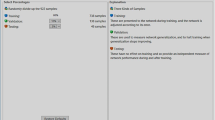Abstract
This paper depicts a research work that uses neural networks to predict academic performance in mathematics, focusing on students enrolled in a public school in Chile. This proposal identifies social, knowledge and psychological issues that impact upon successful learning in a meaningful way. The experience considers different instruments used to gather the necessary information for training the neural network. This information includes the level of knowledge, the logical-mathematical intelligence, the students’ self-esteem and about 80 factors considered as relevant in an international project known as PISA. The most adequate network configuration can be found with different experiments. Results show a good predictive level and point out the importance of using local data for fine tuning.
Preview
Unable to display preview. Download preview PDF.
Similar content being viewed by others
References
Bekele, R., Manzel, W.: A Bayesian Approach to Predict Performance of a Student (APPS): A Case with Ethiopian Students. In: Artificial Intelligence Applications, AIA 2005 (February 2005)
Cripps, A.: Using Artificial Neural Nets to Predict Academic Performance. In: SAC 1996: Proceedings of the 1996 ACM Symposium on Applied Computing, Philadelphia, Pennsylvania, United States, pp. 33–37 (1996)
Mengel, S., Lively, W.: Using a Neural Network to Predict Student Responses. In: SAC 1992: Proceedings of the 1992 ACM/SIGAPP symposium on Applied Computing, Kansas City, Missouri, United States, pp. 669–676 (1992)
Oladokun, V.O., Adebanjo, A.T., Charles-Owaba, O.E.: Predicting Students Academic Performance using Artificial Neural Network: A Case Study of an Engineering Course. The Pacific Journal of Science and Technology (May-June 2008)
Pinninghoff, J.M.A., Salcedo, L.P., Contreras, A.R.: Neural Networks to Predict Schooling Failure/Success. In: Mira, J., Álvarez, J.R. (eds.) IWINAC 2007. LNCS, vol. 4528, pp. 571–579. Springer, Heidelberg (2007)
OECD, PISA 2006 Science Competencies for Tomorrow’s World. Unesco (2006)
Salcedo, L.P., Pinninghoff, J.M.A., Contreras, A.R.: MISTRAL: A knowledge-based system for distance education that incorporates neural network techniques for teaching decisions. In: Mira, J., Álvarez, J.R. (eds.) IWANN 2003. LNCS, vol. 2687, pp. 726–733. Springer, Heidelberg (2003)
Salcedo, L.P., Pinninghoff, J.M.A., Contreras, A.R.: Computerized adaptive tests and item response theory on a distance education platform. In: Mira, J., Álvarez, J.R. (eds.) IWINAC 2005. LNCS, vol. 3562, pp. 613–621. Springer, Heidelberg (2005)
Salcedo, L.P., Pinninghoff, J.M.A., Contreras, A.R.: Putting Artificial Intelligence Techniques into Distance Education. In: Gelbukh, A., Reyes-Garcia, C.A. (eds.) Research in Computer Science. Special Issue: Advances in Artificial Intelligence, November 2006, vol. 26 (2006) ISSN: 1870-6049
Stites, R.L., Ward, B., Walters, R.V.: Defect Prediction With Neural Networks. In: ANNA 1991: Proceedings of the Conference on Analysis of neural network applications. Fairfax, Virginia (1991)
Author information
Authors and Affiliations
Editor information
Editors and Affiliations
Rights and permissions
Copyright information
© 2009 Springer-Verlag Berlin Heidelberg
About this paper
Cite this paper
A., R.C., L., P.S., Pinninghoff J., M.A. (2009). Performance of High School Students in Learning Math: A Neural Network Approach. In: Mira, J., Ferrández, J.M., Álvarez, J.R., de la Paz, F., Toledo, F.J. (eds) Bioinspired Applications in Artificial and Natural Computation. IWINAC 2009. Lecture Notes in Computer Science, vol 5602. Springer, Berlin, Heidelberg. https://doi.org/10.1007/978-3-642-02267-8_55
Download citation
DOI: https://doi.org/10.1007/978-3-642-02267-8_55
Publisher Name: Springer, Berlin, Heidelberg
Print ISBN: 978-3-642-02266-1
Online ISBN: 978-3-642-02267-8
eBook Packages: Computer ScienceComputer Science (R0)




